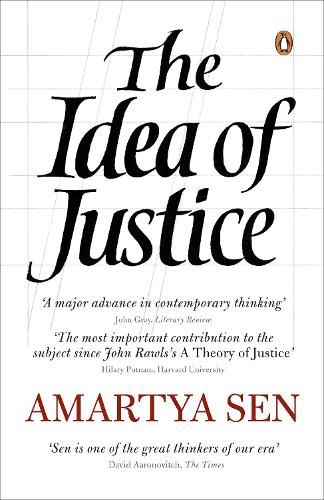Readings Newsletter
Become a Readings Member to make your shopping experience even easier.
Sign in or sign up for free!
You’re not far away from qualifying for FREE standard shipping within Australia
You’ve qualified for FREE standard shipping within Australia
The cart is loading…






A major new philosophical work by the Nobel Prize-winning economist and writer
Is justice an ideal, forever beyond our grasp, or something that may actually guide our practical decisions and enhance our lives? In this wide-ranging book, Amartya Sen presents an alternative approach to mainstream theories of justice which, despite their many specific achievements have taken us, he argues, in the wrong direction in general.At the heart of Sen’s argument is his insistence on the role of public reason in establishing what can make societies less unjust. But it is in the nature of reasoning about justice, argues Sen, that it does not allow all questions to be settled even in theory; there are choices to be faced between alternative assessments of what is reasonable. Sen also shows how concern about the principles of justice in the modern world must avoid parochialism, and further, address questions of global injustice. The breadth of vision, intellectual acuity and striking humanity of one of the world’s leading public intellectuals have never been more clearly shown than in this remarkable book.
$9.00 standard shipping within Australia
FREE standard shipping within Australia for orders over $100.00
Express & International shipping calculated at checkout
Stock availability can be subject to change without notice. We recommend calling the shop or contacting our online team to check availability of low stock items. Please see our Shopping Online page for more details.
A major new philosophical work by the Nobel Prize-winning economist and writer
Is justice an ideal, forever beyond our grasp, or something that may actually guide our practical decisions and enhance our lives? In this wide-ranging book, Amartya Sen presents an alternative approach to mainstream theories of justice which, despite their many specific achievements have taken us, he argues, in the wrong direction in general.At the heart of Sen’s argument is his insistence on the role of public reason in establishing what can make societies less unjust. But it is in the nature of reasoning about justice, argues Sen, that it does not allow all questions to be settled even in theory; there are choices to be faced between alternative assessments of what is reasonable. Sen also shows how concern about the principles of justice in the modern world must avoid parochialism, and further, address questions of global injustice. The breadth of vision, intellectual acuity and striking humanity of one of the world’s leading public intellectuals have never been more clearly shown than in this remarkable book.